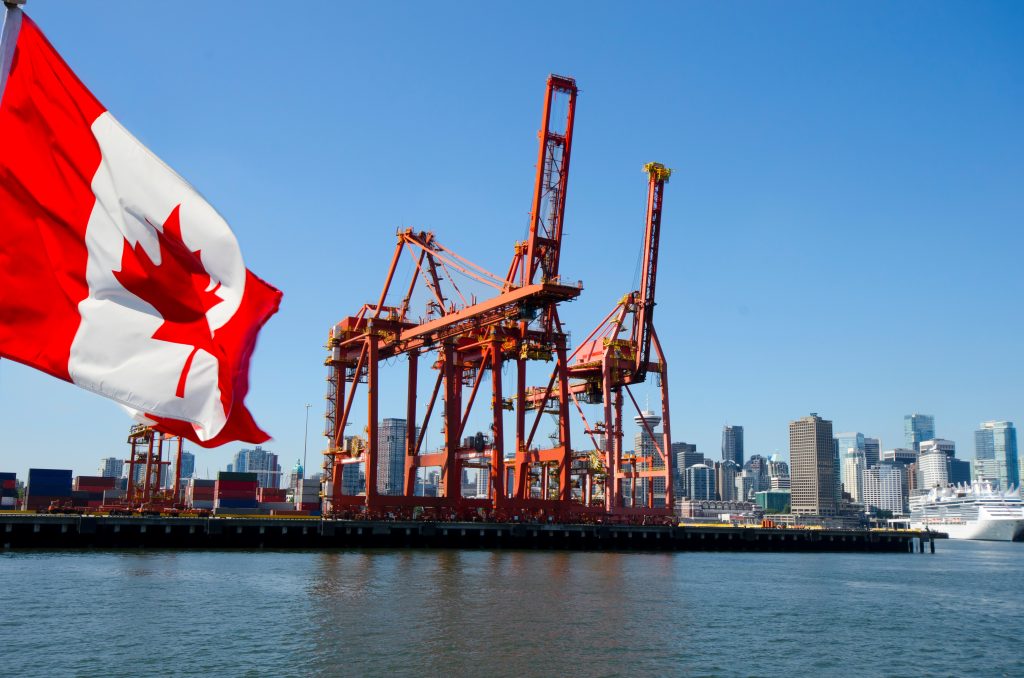

Features
Labour Relations
Tentative four-year deal reached in B.C. port strike, subject to ratification
 The Port of Vancouver. Photo: Adobe Stock
The Port of Vancouver. Photo: Adobe Stock By Brieanna Charlebois and Chuck Chiang
A tentative deal has been reached between employers and workers in the strike that has halted shipments in and out of British Columbia ports for nearly two weeks.
A statement from the B.C. Maritime Employers Association said it has reached a four-year agreement with the International Longshore and Warehouse Union Canada, which represents 7,400 workers in the job action that began July 1.
The tentative deal comes after federal Labour Minister Seamus O’Regan ordered a mediator to issue terms of possible settlement earlier this week, saying the gap in the deadlocked talks was “not sufficient to justify a continued work stoppage.”
In a tweet responding to the tentative deal, O’Regan said “the strike is over,” and the “parties are finalizing details for the resumption of work at the ports.”
Both the union and the employers had 24 hours to respond to the mediator’s recommended terms, which both sides received Wednesday.
The deal is subject to ratification by members of both the union and the maritime employers, and no additional details have been released beyond the association saying it “recognizes the skills and efforts of B.C.’s waterfront workforce.”
Employers are working to restart operations at B.C. ports as soon as possible, but no specific resumption time has been announced, the BCMEA statement said.
O’Regan and Transport Minister Omar Alghabra issued a joint statement Thursday thanking both sides. The ministers said the parties are finalizing details for the resumption of work, but noted the scale of the disruption has been significant.
“The extent of it has shown just how important the relationship between industry and labour is to our national interest. Our supply chains and our economy depend on it,” the statement said.
“Deals like this, made between parties at the collective bargaining table, are the best way to prevent that. They are the best way to preserve the long-term stability of Canada’s economy. But we do not want to be back here again.”
The strike has halted shipments in and out of ports in B.C., including Canada’s largest, the Port of Vancouver.
The Greater Vancouver Board of Trade has said there are 63,000 shipping containers stuck on vessels waiting at B.C. ports to be unloaded as of Wednesday, and that number would have ballooned to 245,000 had the strike persisted to the end of July.
Bridgitte Anderson, CEO of the Greater Vancouver Board of Trade, said the board was pleased to hear the news but noted it would take time for normal cargo operations to resume and for the economy to recover.
“The consequences of the strike have been felt across various industries nationwide and will continue for some time,” she said.
The board estimated that the 13-day strike, which Anderson said was the longest stoppage in more than 40 years, disrupted $9.7 billion in trade as of Thursday morning.
Dennis Darby, CEO of Canadian Manufacturers & Exporters, said in a statement that it is relieved the “crisis” seems to be over, but noted that manufacturers would be spending the “next several months sorting through the damage and getting caught up.”
“The total cost to our industry is not just the days of the strike, but the days and months of work that precede and follow a disruption,” he said. “This is why we need reforms that will avoid a complete shutdown of Canada’s transportation system and supply chains every six months.”
UBC labour relations professor Mark Thompson praised O’Regan for his “good sense of timing” and for not “negotiating in the media.”
“He told the parties they had 24 hours. We don’t know what the alternative to that was and that’s a very good idea that he didn’t make it public,” he said.
Though the details of the agreement have not yet been released, he said he expects operations will resume quickly.
“The port operates very efficiently and they’ll move and they’ll work extra time and I would say that’s a backlog that will be eliminated in fairly short order ? certainly within a couple of weeks, I would say.”
Print this page
